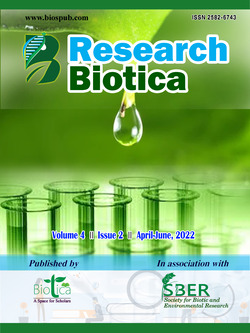
Comparison of Organic Fertilizer vs. Inorganic Fertilizer on the Growth of Cucumber (Cucumis sativus L.)
Divya Tandon
Dept. of Microbiology, SILB, Solan, Himachal Pradesh (173 212), India
Anjali Kumari*
Dept. of Microbiology, SILB, Solan, Himachal Pradesh (173 212), India
Amrita Sharma
Dept. of Microbiology, SILB, Solan, Himachal Pradesh (173 212), India
Vaishali Mehta
Dept. of Microbiology, SILB, Solan, Himachal Pradesh (173 212), India
DOI: https://doi.org/10.54083/ResBio/4.2.2022/82-85
Keywords: Compost, Cucumber, Manure, Organic fertilizers, Sustainable Environment
Abstract
Chemical fertilizers have been utilized extensively over last five to six decades. They significantly contribute in damaging the ecosystem, including the soil properties and the health of the future generation. Organic farming is employed as a substitute to obtain better and healthier output. To increase output and replenish soil fertility without harming the environment or having any negative impacts on human health, organic fertilizers such as sawdust, cow dung and cow urine are used instead of chemical fertilizers. Nowadays, organic farming is widely practiced around the world. Efforts were made to study the effects of organic and inorganic fertilizers on the growth of cucumber (Cucumis sativus L.). Experiment was conducted in pots with four treatments i.e., control (water and soil), organic (cow dung, cow urine, sawdust), inorganic (NPK) and mixture of organic and inorganic. The parameters observed were stem height, number of leaves and the length of leaves. Antimicrobial activity of cucumber leaves, seeds and cow urine was checked on different bacterial strains including E. coli, Pseudomonas sp. and Salmonella sp. Phytochemical analysis was conducted to analyze the presence of alkaloid, carbohydrate, tannins, saponins, flavonoids, terpenoids, phenol and anthraquinone content in cucumber. In comparison to alternative treatments, organic cucumber cultivation produces higher growth rates. Cow urine was more effective against E. coli, moderate against Pseudomonas and resist against Salmonella. The seed extract of cucumber was more effective against Salmonella and less effective against E. coli. The leaf extract is more effective against Pseudomonas and less effective against E. coli. In cucumber leaves alkaloids, carbohydrate, tannins, saponins, flavonoids, terpenoids, phenol and anthraquinone content are present.
Downloads
not found
Reference
Malik, Z.A., Bhat, J.A., Ballabha, R., Bussmann, R.W., Bhatt, A.B., 2015. Ethnomedicinal plants traditionally used in health care practices by inhabitants of western Himalaya. Journal of Ethnopharmacology 172, 133-144. DOI: 10.1016/j.jep.2015.06.002.
Malik, S.N., Subhani, A., Bibi, R., Naseem, W., 2019. Do organic and inorganic mulches affects soil moisture conservation and crop yield. Journal of Applied Agriculture and Biotechnology 3(1), 43-52.
Musa, U.T., Yusuf, M., Olukotun, D.M., 2021. Effect of varying levels of poultry manure and inorganic fertilizer on the growth and yield of cucumber in Anyigba, Kogi state. American Journal of Agriculture Science, Engineering and Technology 5(2), 326-338. DOI: 10.54536/ajaset.v5i2.105.
Xu, W., Qu, W., Huang, K., Guo, F., Yang, J., Zhao, H., Luo, Y., 2007. Antibacterial effect of grapefruit seed extract on food-borne pathogens and its application in the preservation of minimally processed vegetables. Postharvest Biology and Technology 45(1), 126-133. DOI: 10.1016/j.postharvbio.2006.11.019.
Yadav, R.N., Agarwala, M., 2011. Phytochemical analysis of some medicinal plants. Journal of Phytology 3(12), 10-14.
